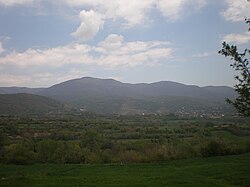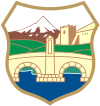Skopska Crna Gora
| Skopska Crna Gora | |
|---|---|
| Macedonian and Serbian: Скопска Црна Гора, Skopska Crna Gora Albanian: Mali i Zi i Shkupit / Malet e Karadakut Turkish: Karadağ | |
 | |
| Highest point | |
| Peak | Ramno |
| Elevation | 1,651 m (5,417 ft) |
| Coordinates | 42°11′24″N 21°26′24″E / 42.19000°N 21.44000°ECoordinates: 42°11′24″N 21°26′24″E / 42.19000°N 21.44000°E |
| Naming | |
| Native name | Скопска Црна Гора |
| Geography | |
 Skopska Crna Gora Location of the mountain within North Macedonia | |
| Location | North Macedonia, Kosovo and Serbia |
Skopska Crna Gora (Macedonian and Serbian Cyrillic: Скопска Црна Гора, pronounced [skôpskaː tsr̩̂ːnaː ɡǒra], Albanian: Mali i Zi i Shkupit; meaning "Black Mountain of Skopje"), often called and only as Crna Gora (Macedonian and Serbian Cyrillic: Црна Гора, Albanian: Mali i Zi; meaning "Black Mountain"), Albanian: Malet e Karadakut), is a mountain range largely in North Macedonia, with smaller parts in Kosovo[a] and Serbia. It lies between the cities of Kaçanik (in southern Kosovo) and Skopje (in Macedonia). The highest peak is Ramno (1,651 m (5,417 ft)) in Macedonia.[1] The largest town on the mountain is Kučevište in North Macedonia.[1]
The Macedonian population of the region speaks the Skopska Crna Gora dialect of Macedonian.
Notable people[]
Culture[]
- Monastery of St. Nikita, dating to the 14th century, with frescoes by Mihajlo and Eftihie.
See also[]
References and notes[]
- Notes
^a Kosovo is the subject of a territorial dispute between the Republic of Kosovo and the Republic of Serbia. The Republic of Kosovo unilaterally declared independence on 17 February 2008. Serbia continues to claim it as part of its own sovereign territory. The two governments began to normalise relations in 2013, as part of the 2013 Brussels Agreement. Kosovo is currently recognized as an independent state by 97 out of the 193 United Nations member states. In total, 113 UN member states are said to have recognized Kosovo at some point, of which 15 later withdrew their recognition.
- References
- ^ Jump up to: a b Мала енциклопедија Просвета [Little Encyclopedia of Prosveta] (in Serbo-Croatian). Belgrade: Prosveta. 1969. p. 589.
Sources[]
| Wikimedia Commons has media related to Skopska Crna Gora. |
- "Skopska Crna Gora", Srpski etnografski zbornik, VI, Belgrade, 1905
- Mountain ranges of North Macedonia
- Mountain ranges of Kosovo
- Mountain ranges of Serbia
- Kosovo–North Macedonia border
- International mountains of Europe
- Rhodope mountain range
- Kosovo geography stubs
- North Macedonia geography stubs


